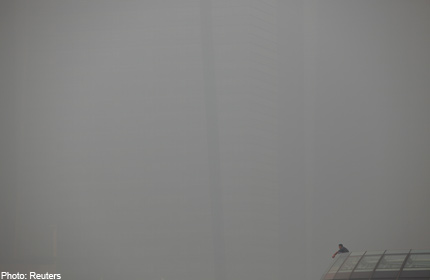
SINGAPORE - The Pollutant Standards Index (PSI) dropped to 268 at 5pm from an all-time high of 371 at 2pm this afternoon.
This puts air pollution levels within the "very unhealthy" range, but still dangerously close to the "hazardous" range of above 300.
A look at the 4pm PM2.5 concentration showed that the concentration of very fine particles in the air has risen from between 232 to 291 micrograms per cubic metre at 12 noon to 247 to 304 at 4pm.
The PM2.5 concentration was 201 to 246 at 8am today. The PM2.5 concentration at 4pm yesterday was between 112 to 143 micrograms per cubic metre.
The hourly updates of 3-hr PSI readings are calculated based on PM10 concentrations only. PM2.5 concentrations are calculated on a 24-hour basis and updated at 8am, 12 noon and 4pm daily.
Around 30 times smaller than a human hair, PM2.5 particles have long been identified as a respiratory problem, as their size enables them to lodge deep in the lungs and penetrate the bloodstream.
As these very fine particles are more hazardous to the health, a range of 40 to 65 typically carries a health advisory from the National Environment Agency (NEA).

NEA has advised children, the elderly and those with heart or lung diseases to reduce prolonged or heavy outdoor activities.
The general population should avoid unnecessary outdoor activity.
MOH has activated the hospitals to prepare for the anticipated increase in the number of cases of asthma, bronchitis and conjunctivitis.
Given the current haze situation, all 23 Government agencies that form the Inter-Agency Haze Task Force (HTF) have been activated and are co-ordinating their respective action plans to mitigate the effects of haze on the public.
The guidelines and advisories issued by the agencies to their respective sectors continue to be relevant. For example, the Ministry of Education (MOE) has disseminated guidelines on limiting outdoor physical activities in schools, and the Ministry of Social and Family Development (MSF) requires childcare centres and kindergartens to cancel all outdoor activities for the children and for the operators to monitor the health situation of the children closely.
In the case of a child falling sick, NEA said that his or her parents should be informed and medical attention sought immediately.
The haze situation could worsen in the coming days, as the number of hot spots in Sumatra quadrupled from 46 to 187 within just a week. According to NEA, June to September is the traditional dry season for the southern ASEAN region. The agency observed that weather conditions in the region have become drier.
In the coming months, occasional extended periods of drier weather can be expected in the region and transboundary smoke haze could affect the region during periods of persistent dry weather conditions, NEA said.
For more haze updates from AsiaOne, click here:


